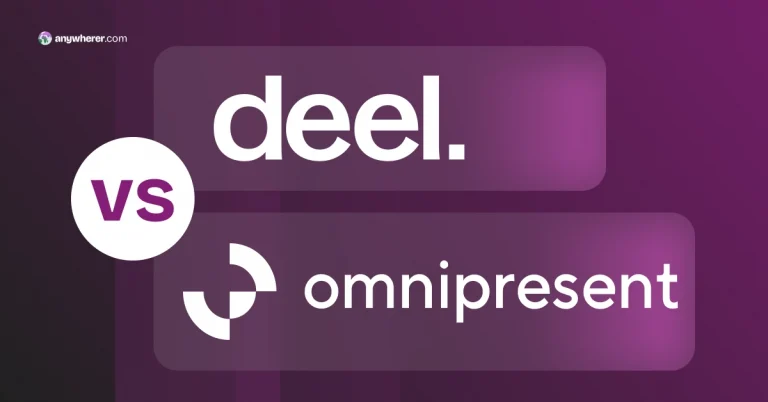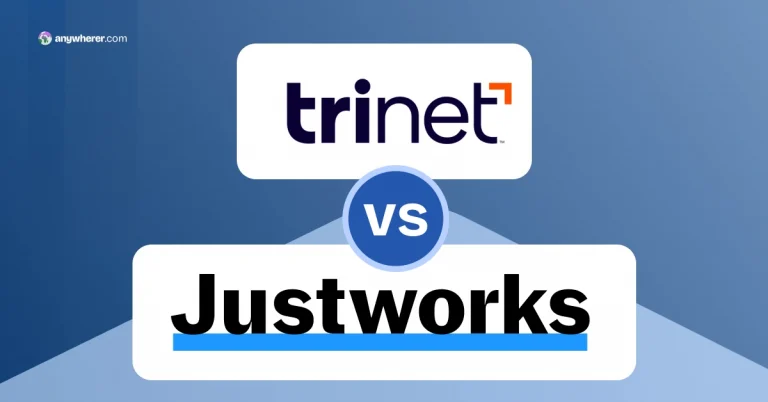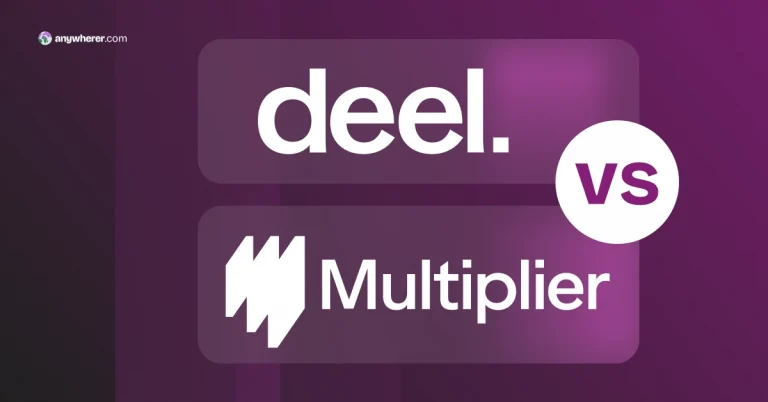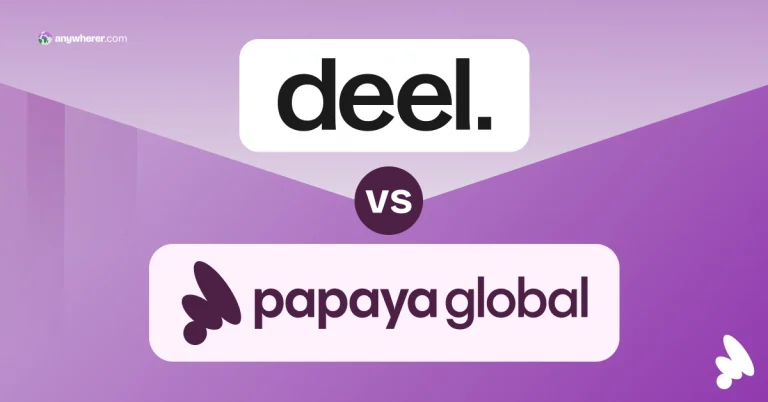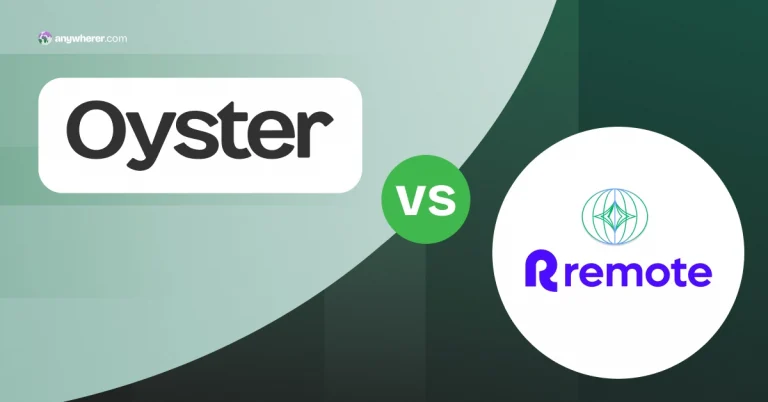Rippling vs Deel Compared
For businesses selecting an Employer of Record (EOR) platform, the comparison often boils down to Deel vs Rippling. And there’s a solid reason for this: both platforms are usually considered industry leaders, each offering unique strengths tailored to different business needs. For those unfamiliar with the EOR meaning, it refers to a model where a third-party provider legally employs workers on behalf of another company – handling payroll, benefits, and compliance.
As two of the most talked-about Rippling competitors, Deel and other platforms are often evaluated in terms of their flexibility, compliance coverage and ease of use. So, which solution is better suited for specific business cases – Deel, proudly positioning itself as “the future of global HR” and “your forever people platform,” or Rippling, branding itself as “an architectural pioneer” advocating for the belief that “the HR platform shouldn’t be limited to HR”?
In this article, we’ll dive deeply into these solutions, covering everything from their functionality and user-centric features to their scalability, compliance standards, and beyond.
Deel vs Ripling: Key Facts
Founded in
Headquarters
Annual Revenue
# of employees
Featured Clients
2019
San Francisco, CA
$500M
5,000+
2016
Headquarters
Annual Revenue
# of employees
Featured Clients
2016
San Francisco, CA
$350M
3,000+
*Data presented above is current as of January 2025.
Global compliance vs integrated compliance monitoring
Deel specializes in global compliance, enabling hiring and management in 150+ countries while simplifying adherence to international labor laws. Plus, Deel’s Compliance Hub automatically alerts customers to new regulations and potential violations across these countries.
Rippling ensures compliance across all of its supported countries with the solution named Compliance 360 — the module offering automated compliance alerts, prioritization, and resolution capabilities. Such a centralized system, integrated seamlessly with the platform’s other HR and payroll modules, ensured an integrated approach to compliance monitoring — plus, supported by seasoned in-house experts.
Global hiring vs integrated workforce management
Deel primarily focuses on HR functions related to global hiring and compliance without extensive integration into IT management.
Meanwhile, Rippling offers a comprehensive platform that integrates HR, IT management, and financial operations.
Self-serve transparency vs onboarding commitment
Deel has a transparent policy for new users, with publicly available, straightforward pricing and a free trial option that allows users to explore its platform before committing.
As for Rippling, to see the platform in action, users must request a demo and inquire about custom pricing.
Deel vs Rippling: Core Differences
Comparison Points
Starting price for contractor management*
Starting price per EOR*
Countries covered
Platform’s core approach
Customer support availability and channels
Free trial
Integrations
$49 per
user/month
Starting from
$599 per employee/month
150+ countries
Hiring and paying teams globally, with ease
Live chat, webform, WhatsApp, email
Yes
100+
Comparison Points
Starting price for contractor management*
Starting price per EOR*
Countries covered
Platform’s core approach
Customer support availability and channels
Free trial
Integrations
$35 base fee per month + $8 per user/month
Custom quote
185+ countries
An integrated approach combining HR, IT, and payroll management
Live chat, in-country HR specialists, single points of contact
No
600+
*Since pricing may vary, the rates shown reflect the status as of January 2025.
Still deciding between PEO and EOR for your business? Check out our in-depth guide on PEO vs EOR to understand the key differences and choose the right model!
Rippling Competitors in Focus: How Deel Compares
Some key details may shed some light on the solutions, but nothing compares to a breakdown of the specific areas where Deel and Rippling are applied. Let’s further explore them.
Which EOR platform scales best with your business size?
Both Deel and Rippling serve primarily mid-market companies, with Rippling having a slightly larger share of mid-sized clients. In the meantime, Deel has a larger portion of its client base in the enterprise category, which may be due to its international payroll features, compliance across multiple jurisdictions, and scalable solutions.
- Enterprises: 10% of Deel’s clients, 2% of Rippling’s client base.
- Mid-sized businesses: 50% of Deel’s clients, 60% of Rippling’s client base.
- SMBs: 40% of Deel’s clients, 38% of Rippling’s client base.
Sources:
Which EOR is more commonly used across different regions?
Rippling dominates the US market with its integrated HR and IT solutions. In contrast, Deel provides tailored solutions for global payroll, compliance, and managing cross-border teams, making it a good fit for companies outside North America.
- North America: 11% of Deel’s clients, 92% of Rippling’s client base.
- Europe: 15% of Deel’s clients, 1.5% of Rippling’s client base.
- Latin America: 15% of Deel’s clients, 1% of Rippling’s client base.
- Asia: 26% of Deel’s clients, 4% of Rippling’s client base.
- Middle East & Africa: 10% of Deel’s clients, 0.5% of Rippling’s client base.
- Australia: 0.5% of Deel’s clients, 0.5% of Rippling’s client base.
Sources:
What are the primary sectors where Deel and Rippling are implemented?
The most common industries for both Deel and Rippling are IT & Computer Software, Financial & Legal Services, and Marketing and Advertising – and there’s a good reason for it. They all often have remote, international teams and require strict compliance, making these platforms essential for managing distributed workforces.
Meanwhile, Rippling acts as a viable Deel alternative for sectors like healthcare that require integrated employee management, regulatory compliance, and workforce flexibility.
- IT & Computer Software: 62% of Deel’s and 76% of Rippling’s client base.
- Financial & Legal Services: 12% of Deel’s and 15% of Rippling’s client base.
- Marketing, Advertising, Translations: 13% of both Deel’s and Rippling’s client base.
- Hospital & Health Care: 12% of Rippling’s and 4% of Deel’s client base.
- Consumer Services: 7% of Deel’s and 1% of Rippling’s client base.
Sources:
How do companies commonly leverage Deel and Rippling platforms?
Based on the review of highlighted customer cases, Deel leads in global hiring and market expansion, while Rippling excels in payroll and HR efficiency. Additionally, Deel is noted for a higher proportion of use cases emphasizing time and cost savings compared to Rippling, thus proving it a good fit for businesses that aim to streamline operations.
- Global hiring, scaling, and market expansion: 35% of Deel’s case studies and 30% of Rippling’s cases.
- Payroll, HR, and operational efficiency: 26% of Deel’s case studies and 40% of Rippling’s cases.
- Time and cost savings: 19% of Deel’s case studies and 10% of Rippling’s cases.
- Compliance and legal simplification: 11% of Deel’s case studies and 20% of Rippling’s cases.
Side-by-Side Comparison of Deel vs Rippling
In this comparison, we assess these two solutions from multiple angles: solutions’ user experience, performance, presence, and pricing. So, let’s dive in.
Platform Experience (Technology & UX)
In terms of ease of use, Deel and Rippling cater to different user needs with their platform designs. For instance, Deel emphasizes a global orientation with a user-friendly setup for managing cross-border HR tasks, offering an intuitive interface that simplifies navigation, particularly for international teams.
Meanwhile, Rippling’s core advantage in terms of platform experience lies in its modular design. It allows users to customize features for comprehensive HR and IT management. However, it has its downsides, too – for example, users often report that its extensive customization and multi-feature integration make it more challenging to navigate.
Top platform experience aspects for Deel:
- Ease of use for global operations thanks to seamless cross-border payroll, localized contracts, and tax compliance in 150+ countries.
- Streamlined, intuitive interface enabling quick setup and minimal learning curve.
- Robust customer support with a focus on localized assistance and compliance.
Top platform experience aspects for Rippling:
- A customizable platform with a modular approach at its core.
- A unified platform simplifying data management and operations.
- Pre-built templates and a no-code workflow builder to automate complex tasks.
Performance (Features and Functionality)
Comparing Deel and Rippling functionality, Rippling is known for areas like HR management, IT management, and benefits administration. It’s designed to serve as an all-in-one platform for both remote and in-office teams, handling everything from payroll to employee devices and performance management. Besides, Rippling emphasizes automation and integration across HR, payroll, and IT tasks, streamlining operations with features like automated tax calculations, payroll management, and employee benefits compliance across multiple jurisdictions.
Deel, on the other hand, specializes in international payroll and compliance, excelling in managing contractors and global teams. While its focus is narrower than Rippling’s broad suite of features, Deel’s strengths lie in its robust capabilities tailored for global workforce management. Both platforms address unique aspects of workforce operations, catering to specific business priorities.
Top functionality differentiators for Deel:
- Deel Card available as an alternative corporate debit card.
- Deel Advance for short-term cash advances at no interest rate for eligible independent contractors.
- Deel’s background checks for automated hire screening.
- Mobility support services provided by Deel experts.
Key functionality highlights for Rippling:
- Rippling Workflow Studio for next-level automation.
- Built-in HRIS module to streamline workforce management.
- Worker Classification Analyzer to mitigate misclassification risks.
- Advanced custom reports unifying workforce analytics.
Presence (Geographical Coverage)
Deel and Rippling both offer global workforce management solutions with diverse geographical coverage and services. Both claim to cover over 150+ countries, empowering companies to streamline their operations and scale internationally with ease.
Meantime, while Deel focuses heavily on simplifying international payroll, compliance, and benefits for remote teams, Rippling users mention its significant value primarily for both US-based businesses and international ones, all thanks to Rippling’s integrated suite of global payroll, HR, and IT management solutions.
Deel features for international efficiency:
- Tools like Global Salary Insights and Global Employment Comparison enhance global payroll capabilities.
- Local compliance worldwide.
- International employee benefits compliant with local laws.
Rippling features that support global coverage:
- International payroll suite supporting automated workflows and integrations.
- International contractors’ management with localized agreements and automated workflows.
- Access to expert local advisors.
- Built-in global HRIS.
Deel vs Rippling Pricing
Deel’s pricing is often considered flexible for companies of different sizes, with various tiers depending on the services needed. While it can be more expensive for smaller businesses, companies with complex international operations may find the investment worthwhile for its compliance automation and global payroll features. Yet, companies need to consider hidden costs that could arise from currency conversion, complex tax compliance, or custom solutions.
Rippling, in turn, offers cost-efficient pricing for small to medium-sized businesses within the US due to its unified platform for HR, IT, and payroll. However, extra costs might come from custom features and extra services, adding up to the total cost.
Given that prices may vary, our analysis is based on the rates available in January 2025:
Deel pricing
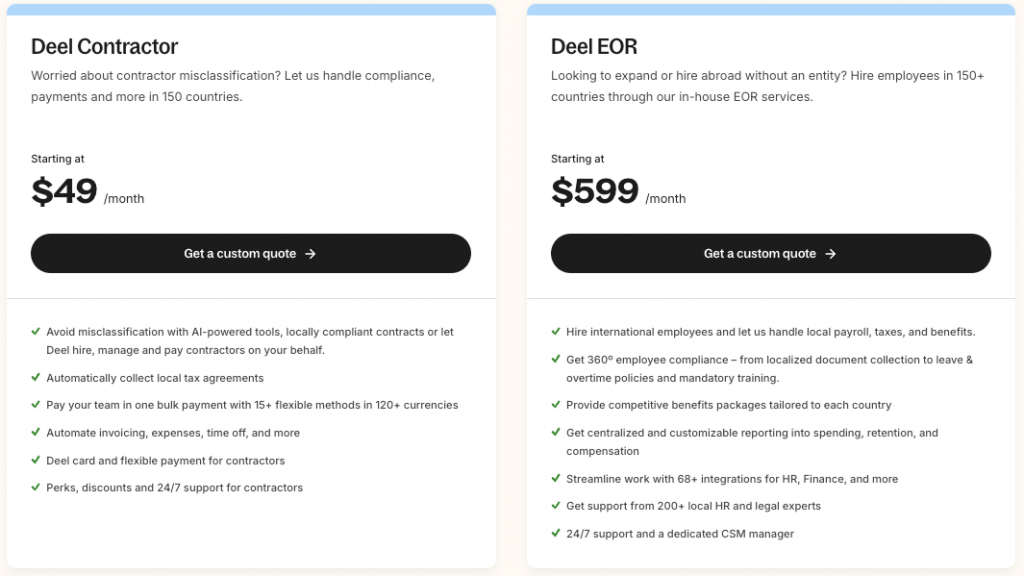
Rippling pricing
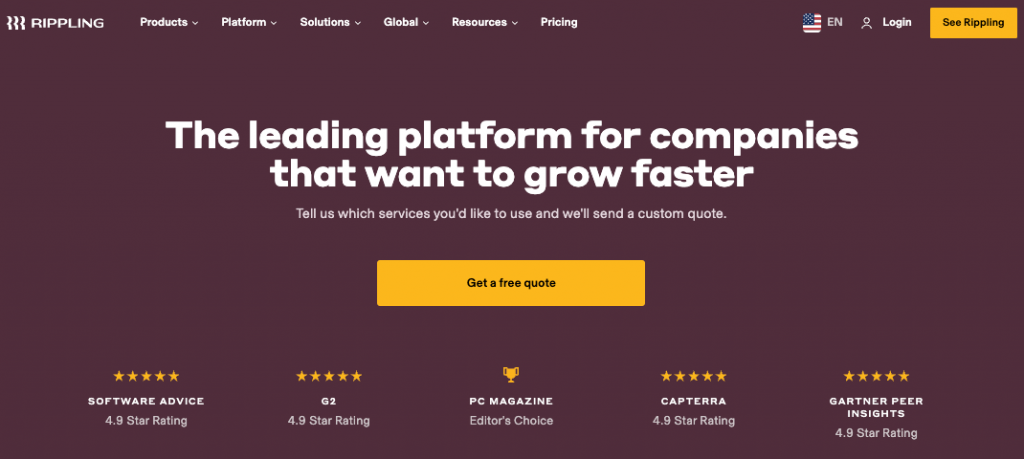
Rippling offers contractor management services at a cost of $35 per month as a base fee, plus $8 per user per month. For its EOR services, pricing is available on a custom-quote basis, tailored to specific business needs.
Explore Detailed Deel and Rippling Reviews
Extra Criteria to Consider When Assessing Rippling and Deel
Scalability
Deel is designed with a global-first approach, making it highly scalable for organizations operating across multiple countries. Its specialization in international compliance and payroll specialization ensures seamless operations for businesses managing contractors and employees worldwide.
Deel’s scalability stories:
- Form3 grew their workforce 20% in one year using Deel.
- Taktile expanded launched in +3 markets.
- Sellit9 hired new employees in 6+ countries with Deel.
Similarly, Rippling enables global scaling in 185+ countries, offering fully functional solutions for global teams, including Global Payroll, EOR, Global Contractors, Compliance 360, and HRIS.
Ripling’s scalability stories:
- Enterpret scaled its team to the US with Rippling.
- Minfy streamlined its US-based growth thanks to Rippling’s capabilities.
- Sayari grew its global workforce by 5x.
Mobile Accessibility
Both Deel and Rippling offer mobile apps, enabling users to manage key tasks like payroll, approvals, and employee data on the go. While neither platform has a standout mobile application in terms of advanced functionality, their apps are sufficient for most essential day-to-day operations.
| Mobile Operating Systems | Rippling | Deel |
|---|---|---|
| IoS | Rating: 4.6 2.3K ratings | Rating: 4.9 390 ratings |
| Android | Downloads: 100K+ Rating: NA | Downloads: 10K+ Rating: 4.8 |
All ratings are based on the most recent data available as of January 2025. Sources include: App Store (Rippling and Deel) and Google Play (Rippling and Deel) data.
Customer Support
When it comes to customer service efficiency, Deel provides 24/7 customer support through live chat, web form, and WhatsApp, with reported quick response times and support in multiple languages. Additionally, it offers dedicated account managers and direct assistance for all users, including contractors and employees.
In contrast, Rippling provides a single point of contact for client support and in-country HR specialists. Besides, it publicly discloses its live support metrics, further contributing to the collaboration transparency and quality standards.
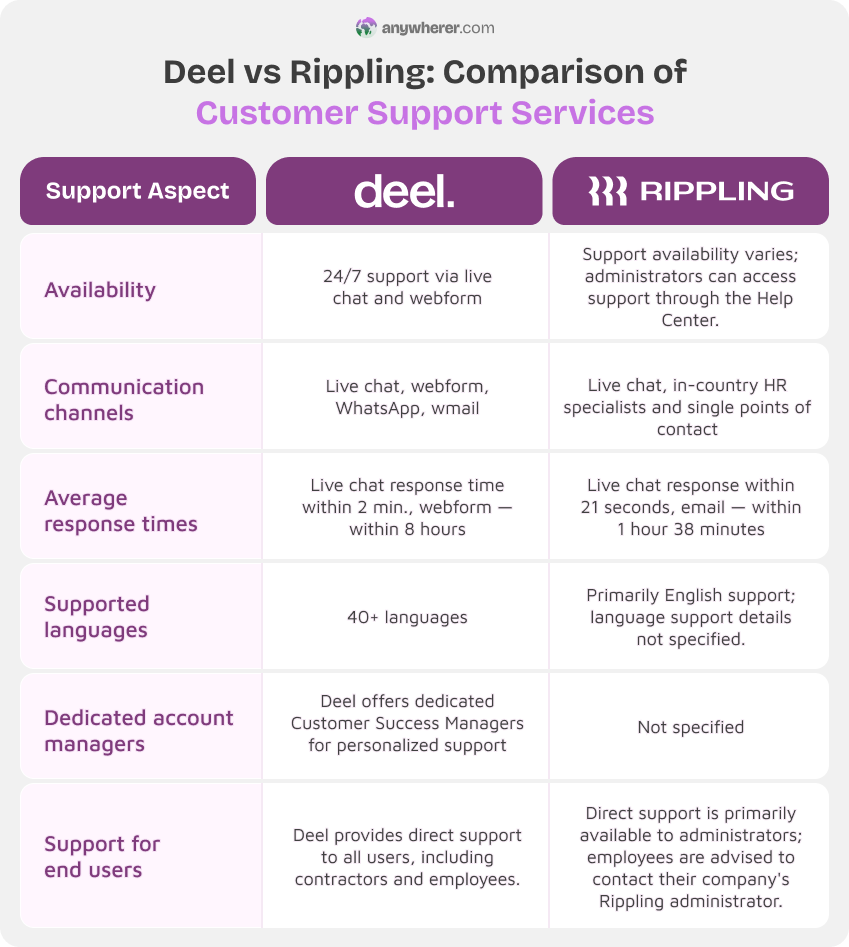
Rippling vs Deel: What Users Think
While both platforms have high ratings across their user bases, we’ll explore specific user scenarios in greater detail. In doing so, we’ll dive into the end-user perspective, highlighting the key aspects that users like and dislike about Deel and Rippling.
Deel vs Rippling: User Reviews and Ratings
Deel vs Rippling Core Strengths
Both Deel and Rippling are highly rated platforms, each excelling in key areas. Deel is praised for its exceptional ease of use, intuitive interface, and seamless payment features, making it a top choice for users prioritizing simplicity and efficiency.
Rippling, on the other hand, offers robust features designed to address broad management needs, providing versatility for users with complex requirements.
Deel and Rippling:
Strengths Based on User Reviews
Ease of use, platform simplicity
Efficiency for global HR operations
Versatility
Speed of processes
Easy payments
Ease of use, intuitiveness
Platform’s versatility
Robust automation and customization
Global payroll efficiency
Customer support responsiveness
Rippling vs Deel Insights from Users
Zooming out on client feedback, it becomes evident that Deel and Rippling’s weaknesses widely vary. For Deel, the major user inconvenience lies in costs and several operational inefficiencies, while Rippling users often complain about onboarding and the robustness of the solution.
Deel and Rippling:
Considerations Based on User Reviews
High fees
Withdrawal issues
Customer support inefficiencies
Operational inefficiencies
Exit fees and extra expenses
Missing or limited features
Steep learning curve
EOR inefficiencies
Extra fees
The platform’s high cost for smaller teams
Rippling and Deel Functionality Highlights
Deel and Rippling are robust platforms designed to streamline workforce management, each excelling in distinct areas and offering unique features. Let’s explore their core capabilities in detail.
Deel: Payroll Processing
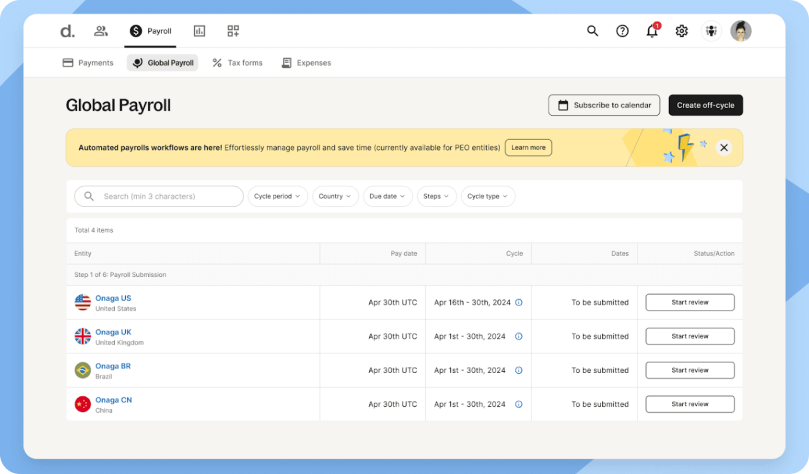
Deel provides robust payroll features designed for global teams, with 50+ proprietary payroll engines offering global coverage in over 100 countries and support for multiple currencies and cross-border payments.
Top features for payroll processing:
- Automated tax compliance for international teams and local labor law adherence.
- Customized payroll schedules with options for contractor payments.
- Country-specific compliance, including tax filings and withholding.
Rippling: Payroll Processing
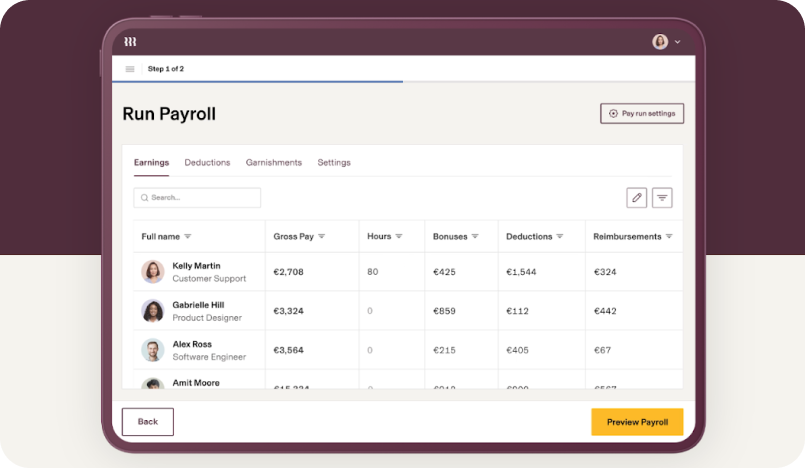
Rippling offers comprehensive payroll features tailored primarily for US-based teams, with seamless integration into HR and IT systems to simplify payroll management. However, some of its global payroll capabilities rely on third-party integrations to support international employees.
Top features for payroll processing:
- Automated tax handling for US teams, covering both federal and state filings.
- Nationwide direct deposit support for employees.
- Flexible payroll scheduling for both hourly and salaried workers.
Deel: Contractor Management
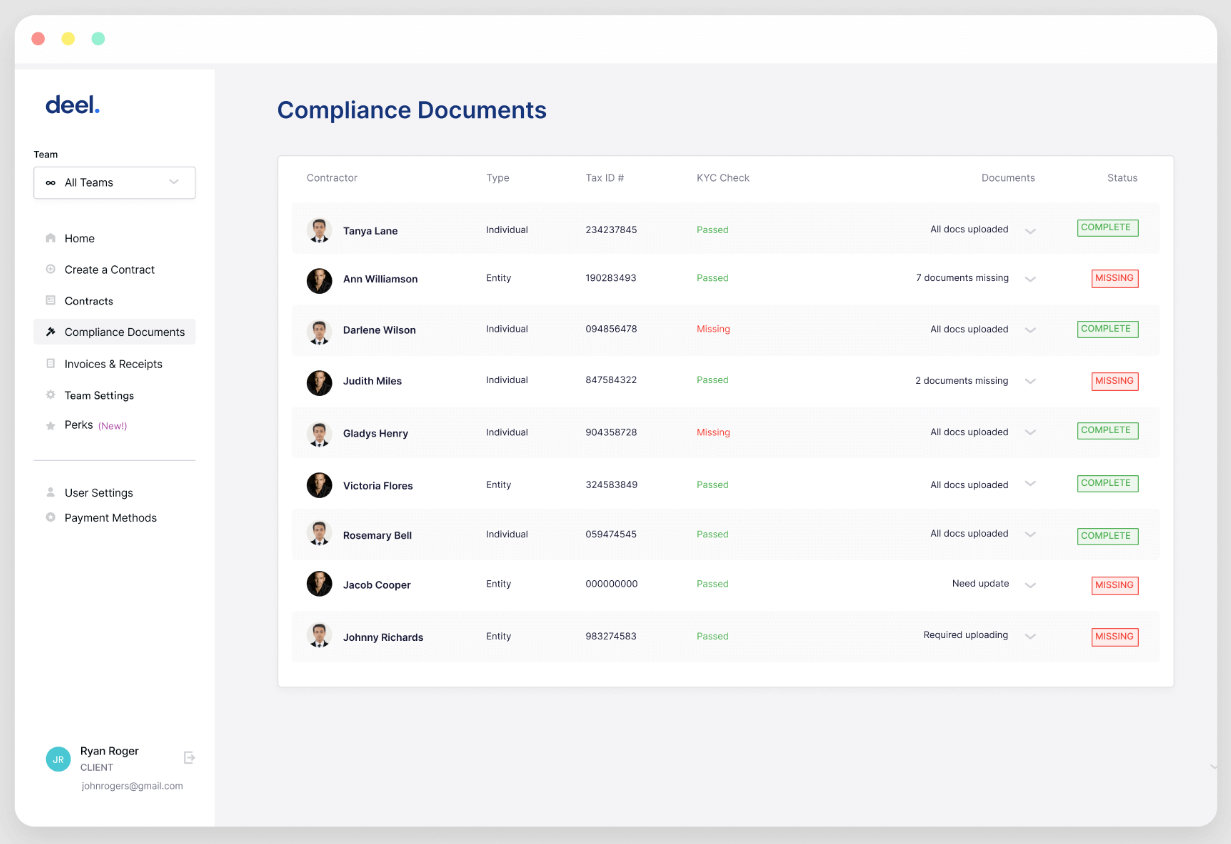
Deel specializes in global contractor management, supporting customizable contracts in multiple languages and currencies along with localized tax compliance for contractors in over 100 countries.
Deel’s top features for contractor management include:
- Automated country-specific contract creation and signing.
- AI-powered worker classification reducing non-compliance risks.
- One-click mass payouts in 120 currencies, including cryptocurrency options.
- Flexible payment schedules, including one-time and recurring payments.
Rippling: Contractor Management
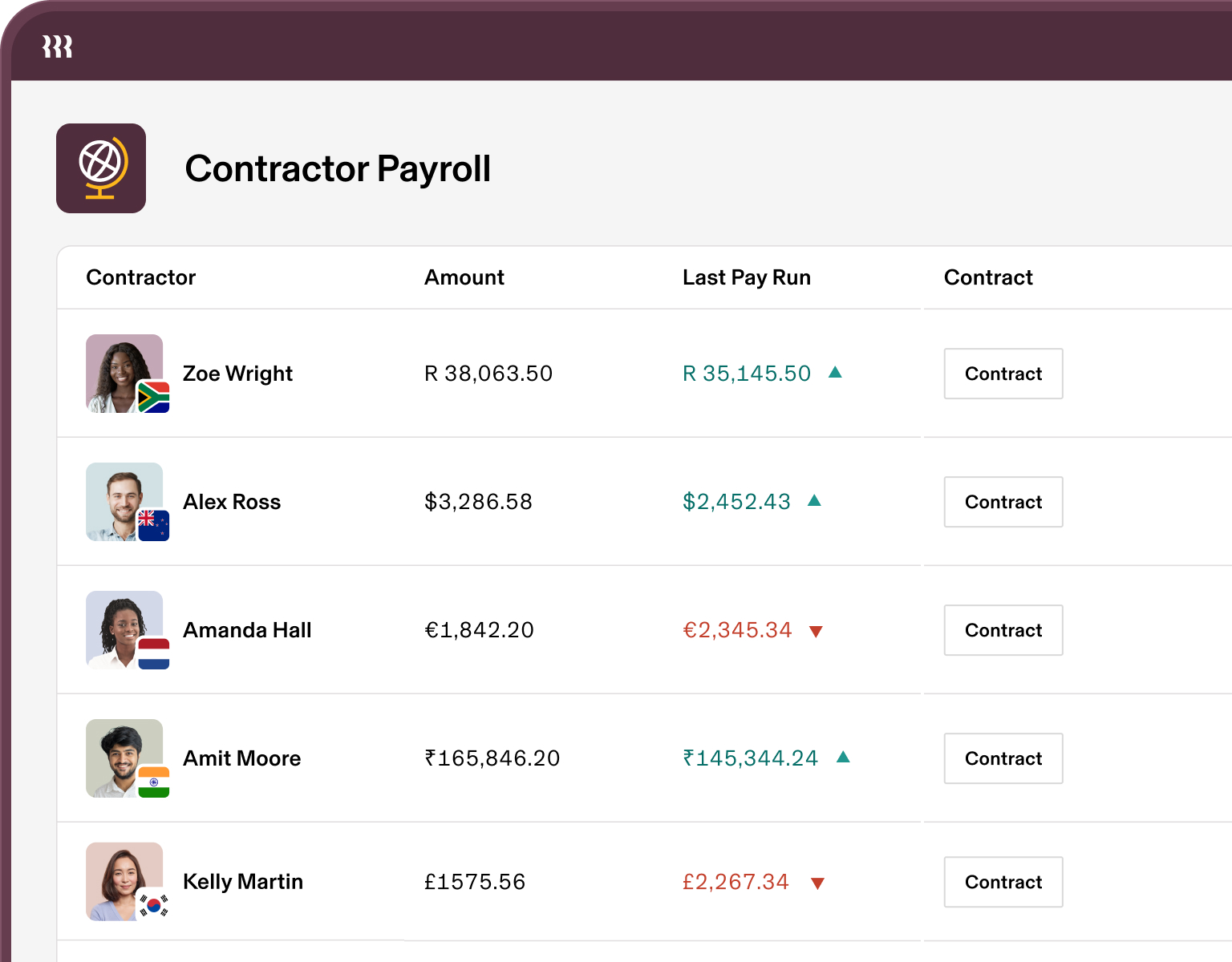
Rippling’s contractor management capabilities are well-suited for both U.S.-based contractors and international needs. The platform offers onboarding and contract management tools that simplify the setup process for contractors, including contractor recordkeeping, time tracking, invoicing, and others.
Rippling’s top features for contractor management are:
- Employee KYC verification.
- Automated invoicing and approvals for various contractors.
- Customized approval routing policies.
- Workflows to escalate invoice approval reminders.
Deel: Benefits Administration
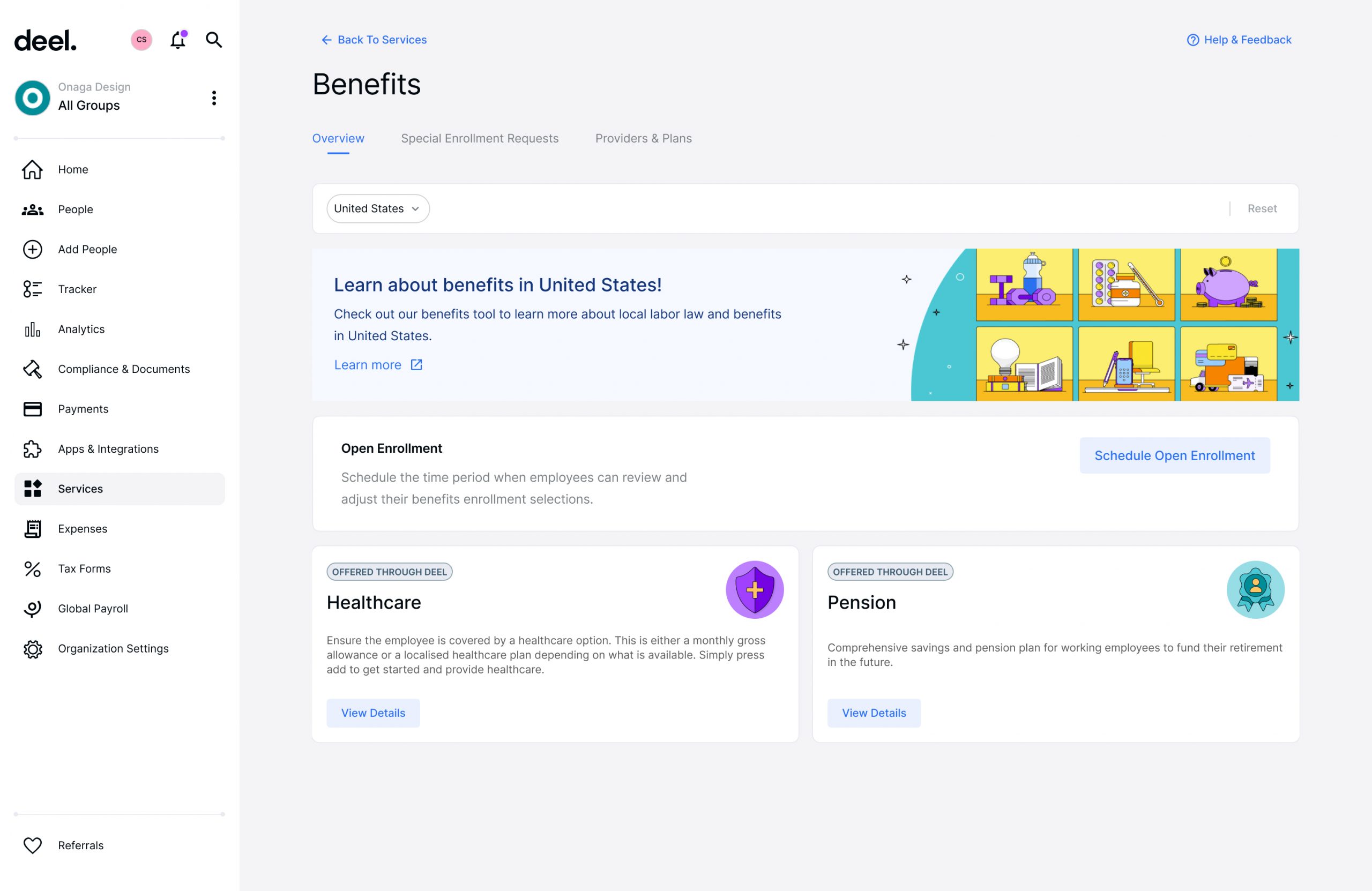
Deel provides basic benefits management features, focusing on supporting global teams with localized options in more than 50 countries.
Deel’s Global Benefits Tool allows for exploration of country-specific benefit requirements. Meantime, it’s emphasized that these resources should not replace personalized legal or tax advice for specific situations.
Deel’s top features for benefits management include:
- PTO management, limited bonus payments, and performance-based rewards.
- Basic health insurance and retirement plans available in select countries.
- Customizable benefits packages tailored to comply with local laws and regulations.
Rippling: Benefits Administration
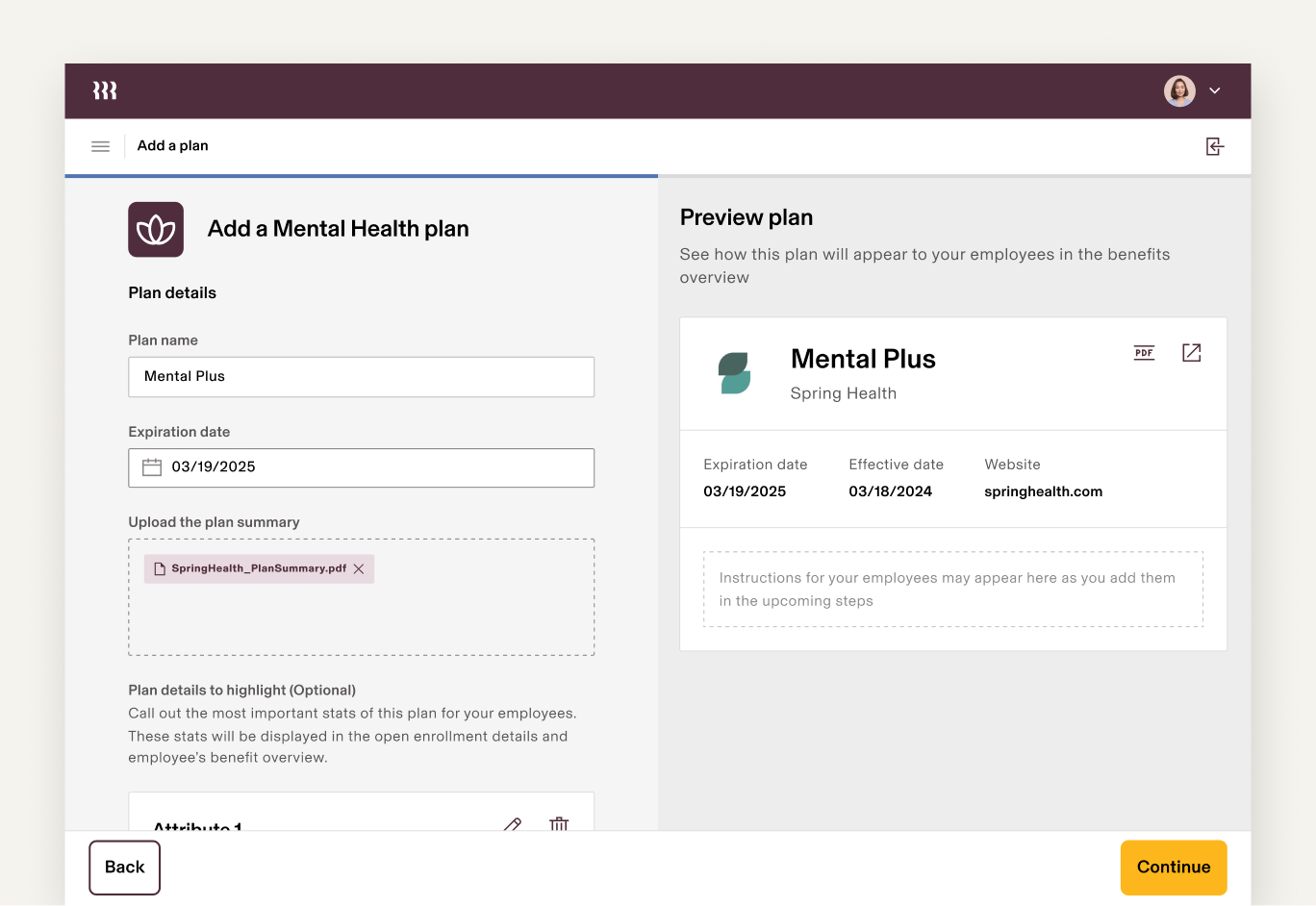
Rippling’s benefits enrollment software provides robust tools for managing and automating employee benefits, including health insurance, 401(k) plans, stock options, and perks like wellness and commuter benefits.
Meanwhile, it needs to be noted that Rippling’s benefits administration capabilities are more widely oriented toward supporting U.S.-based employees compared to remote workers in less popular locations.
Rippling’s top features for benefits management include:
- Pre-built workflow templates to manage employee benefits.
- The ability to connect employees’ current coverage in seconds.
- Self-service portal to quote, compare and enroll in benefit plans.
Deel: Compensation Flexibility
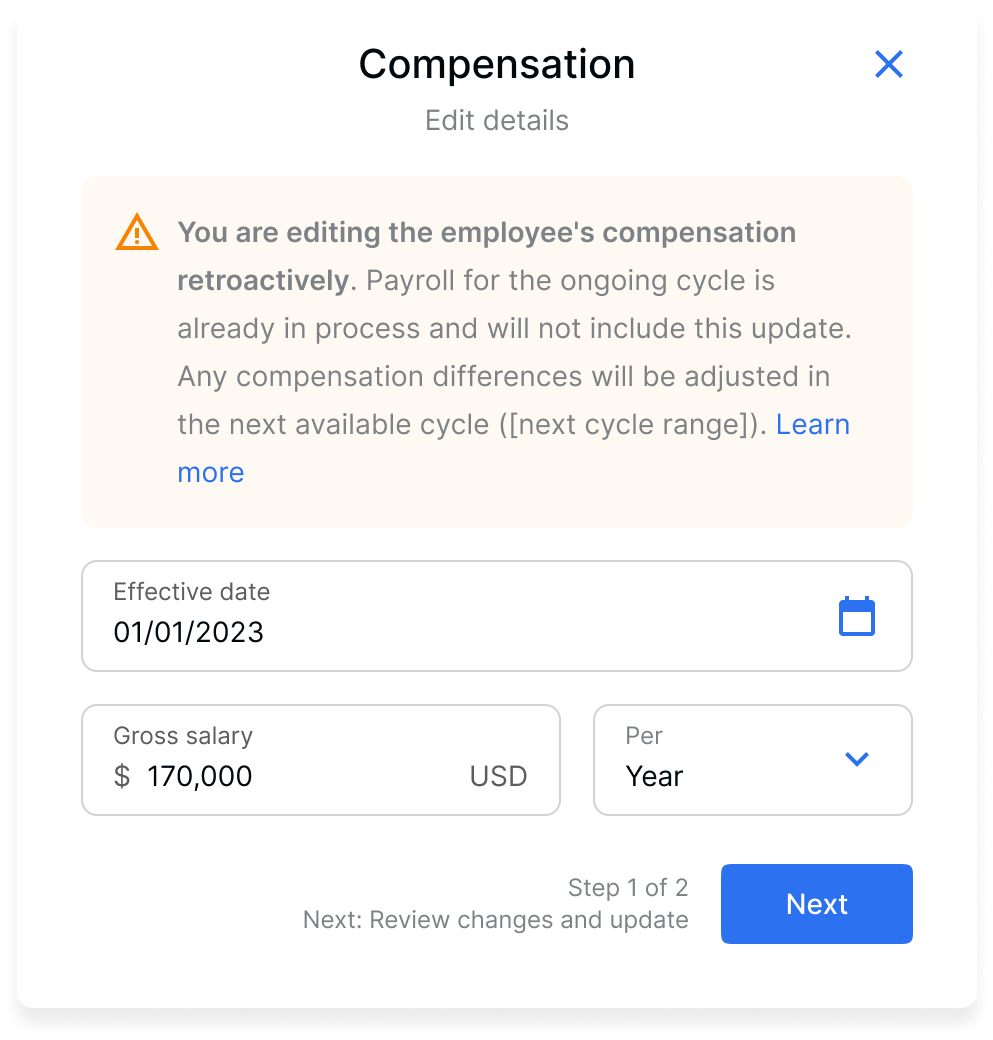
Deel provides comprehensive compensation management for global teams with multi-currency payroll processing. The platform supports contractors, full-time employees, and temporary workers, thus ensuring compliance with local tax laws and market-specific compensation standards.
Deel’s top features for compensation management include:
- Ability to handle equity compensation, bonuses, and variable pay.
- Flexible pay schedules: monthly, bi-weekly, or one-off payments.
- Global compensation benchmarking for different markets.
Rippling: Compensation Flexibility
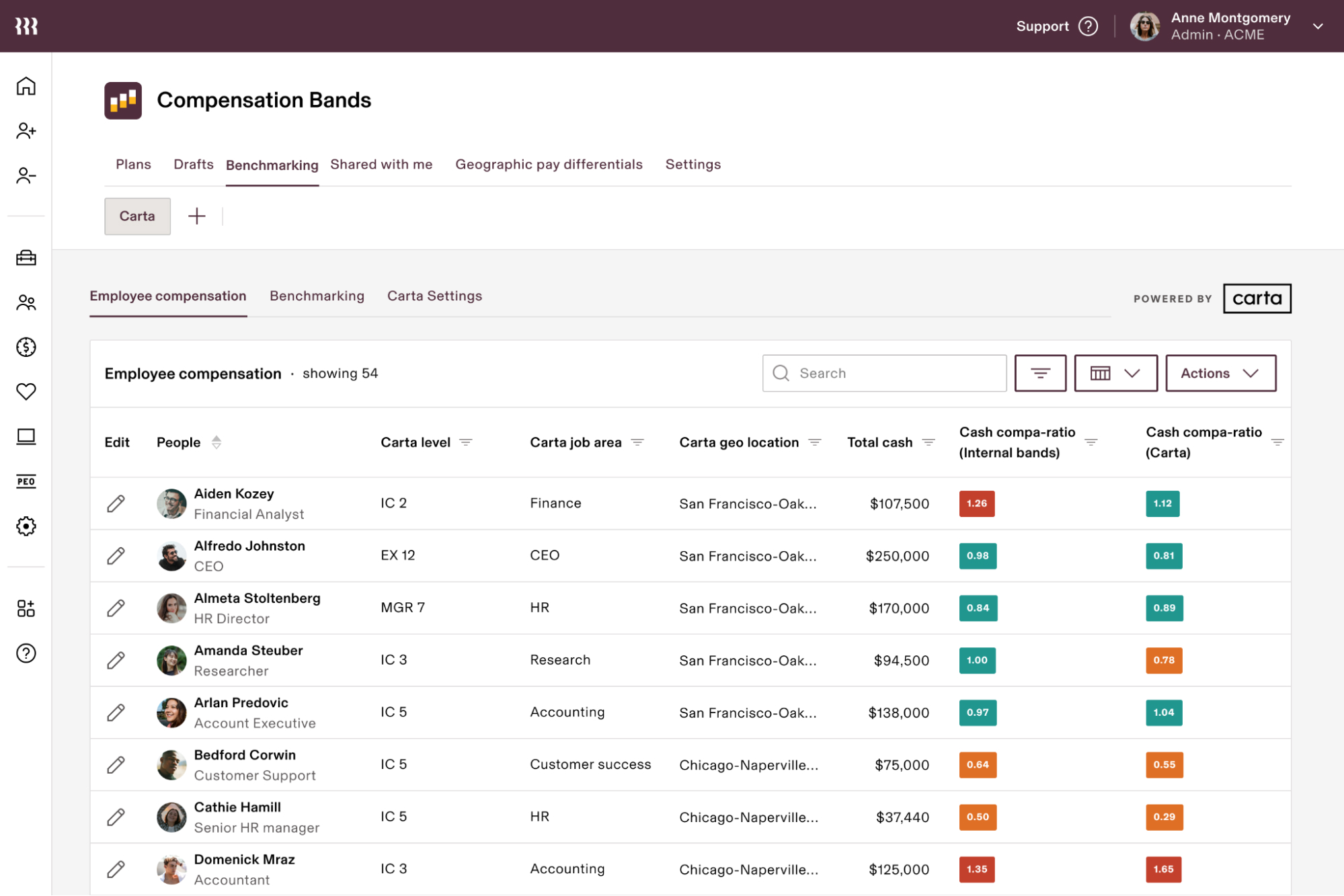
Rippling offers a comprehensive compensation management system designed to provide flexibility and control over employee pay structures. Rippling’s system supports various forms of compensation, including salaries, bonuses, and equity, and automates payroll processes to reduce errors and save time.
Rippling’s top features for compensation management include:
- Compensation bands allowing for the creation of standardized pay ranges for roles.
- Rippling headcount planning with real-time insights into headcount costs.
- Integration of compensation adjustments with performance reviews for efficient promotion management.
How Rippling and Deel Handle Security and Data Privacy
While both Rippling and Deel prioritize security and data privacy, their approaches and areas of focus differ.
Rippling prioritizes robust data security and compliance, adhering to both U.S. and international standards. It holds certifications such as SOC 2 Type II, SOC 3, ISO 27001, and ISO 27018, which altogether ensure security, availability, confidentiality, and personal data protection in the cloud. With this comprehensive approach, Rippling proves its commitment to meeting global regulatory requirements.
Deel, in turn, emphasizes global operations and compliance, using safeguards to secure EU-US data transfers and maintain EU privacy standards internationally. Besides, Deel’s use of AWS EKS clusters and daily backups supports scalability and security across multiple regions.
| Aspect | Rippling | Deel |
|---|---|---|
| Compliance | ✓ GDPR ✓ CCPA | ✓ GDPR ✓ International data protection laws |
| Key Certifications | ✓ SOC 1 Type II ✓ SOC 2 Type II ✓ ISO 27001 ✓ ISO 27018 | ✓ SOC 2 ✓ ISO 27001 |
| Data Transfer Safeguards | ✓ EU-US Data Privacy Framework ✓ Standard Contractual Clauses | |
| Infrastructure Security | ✓ US-based AWS data centers ✓ Multiple availability zones | ✓ AWS EKS clusters in all availability zones ✓ Daily backups |
| Employee Training | ✓ Background checks ✓ Privacy and security training |
Final Thoughts on Rippling and Deel Offerings
Further reflecting on the Deel vs Rippling analysis, both solutions are robust and capable of addressing multiple business needs. Ultimately, businesses should evaluate their specific requirements to determine which platform aligns best with their goals. Key considerations include:
- Compliance needs
Assess the level of compliance support required, such as global tax filings, labor law adherence, and contractor classification. Deel is ideal for international compliance, Rippling is well-suited for both US-centric and cross-border compliance requirements.
- Ease of use
Consider the platform’s learning curve and user interface. Deel offers a streamlined experience for global teams, whereas Rippling’s modular design provides flexibility but may take more time to master.
- Pricing
Evaluate the cost-effectiveness of each platform relative to your workforce size and operational needs. Deel provides competitive pricing for global teams, while Rippling’s modular structure allows businesses to pay only for the features they need.
- Growth strategy
Align your choice with your business’s expansion plans. If global scaling is a priority, Deel’s international features may be a suitable option. For those prioritizing comprehensive HR, IT, and Finance integration, Rippling’s all-in-one platform could be a good choice compared to other Rippling competitors.
FAQs about Deel vs Rippling
What are the key differences between Deel and Rippling’s EOR services?
Rippling has a greater presence in the U.S. market compared to Deel, with a modular platform tailored to mid-sized businesses. Additionally, Rippling offers a high level of customization and flexibility well-suited for various HR needs. Deel, in turn, focuses on scalability, data-driven HR insights, and global payroll capabilities, with slightly less focus on workflow automation.
How easy is it to onboard employees with Deel vs Rippling?
The Deel platform stands out among other Deel alternatives by offering a streamlined onboarding process tailored for global employees, including automated localized contracts and compliance checks. Both platforms offer robust onboarding. Meanwhile, note Rippling provides more customization features, which may impact the speed of the onboarding process.
Do both platforms support full-time employees and contractors?
Yes, both Deel and Rippling support full-time employees and contractors, providing international contractors with tools for multi-currency payments and country-specific compliance.
How do Deel and Rippling help with compliance in different countries?
Both Deel And Rippling provide comprehensive compliance support, including localized tax filings, labor law adherence, and international worker classification.
Which platform offers more competitive pricing for EOR services?
Deel is a strong Rippling competitor that generally provides competitive and transparent pricing for global EOR services due to its focus on international markets and localized solutions, even though extra fees can add up. While Rippling’s pricing structure is competitive for domestic operations, the overall cost can vary depending on the specific international features or integrations required. Businesses are encouraged to compare both platforms based on their unique needs and calculate the total cost of ownership, including potential add-on fees or region-specific charges, to determine which aligns better with their budget and operational goals.
How do Deel and Rippling manage payments in different currencies compared to Rippling competitors?
Deel supports payments in over 120 currencies, including cryptocurrencies, with one-click mass payouts and flexible schedules. Rippling, as a strong Deel competitor, handles multi-currency payments with equal efficiency, while also relying on third-party integrations for broader currency management.
Is there a difference in response time or service quality between Deel and Rippling?
On average, Rippling reports faster customer response time than Deel, even though Deel boasts 24/7 support and equally diversified communication channels.
How secure are Deel and Rippling in terms of protecting employee and company data?
Both Deel and Rippling prioritize data security through industry-standard encryption and compliance with data protection regulations.
Explore more details to determine whether Deel or Rippling is the ideal EOR solution for your business!

Yaryna is our lead writer with over 8 years of experience in crafting clear, compelling, and insightful content. Specializing in global employment and EOR solutions, she simplifies complex concepts to help businesses expand their remote teams with confidence. With a strong background working alongside diverse product and software teams, Yaryna brings a tech-savvy perspective to her writing, delivering both in-depth analysis and valuable insights.


